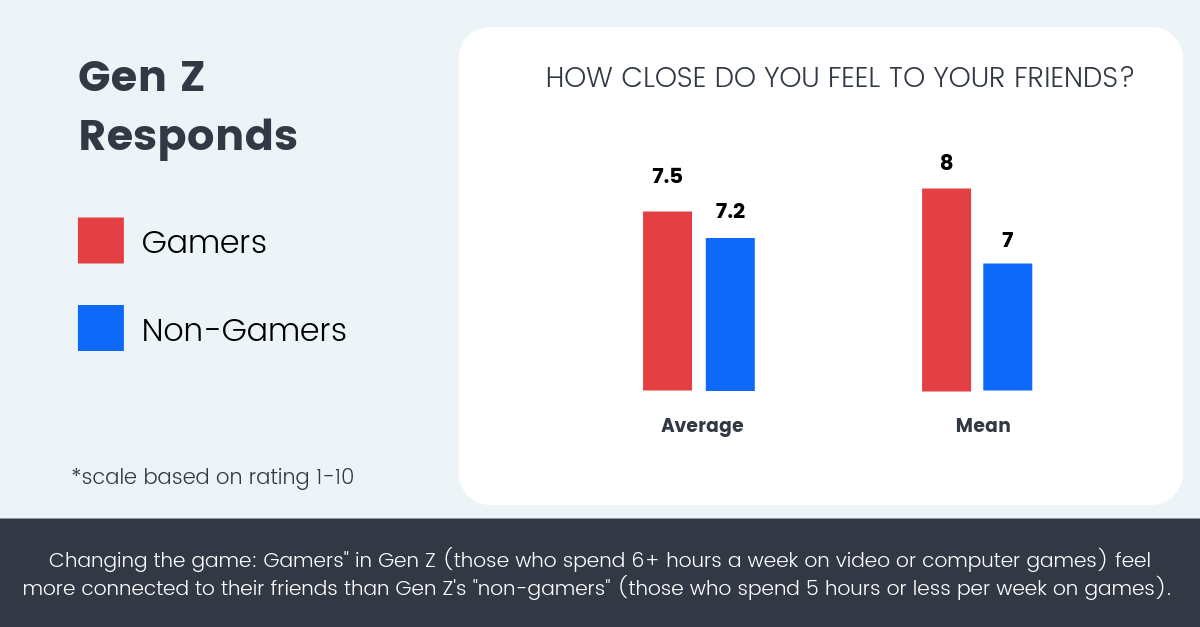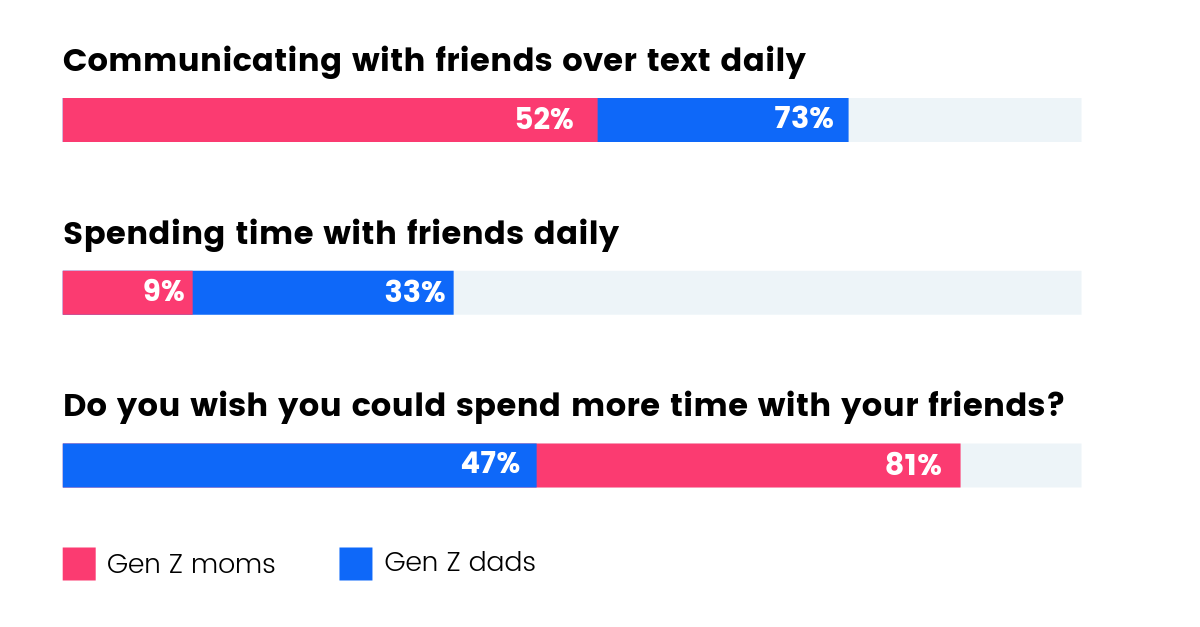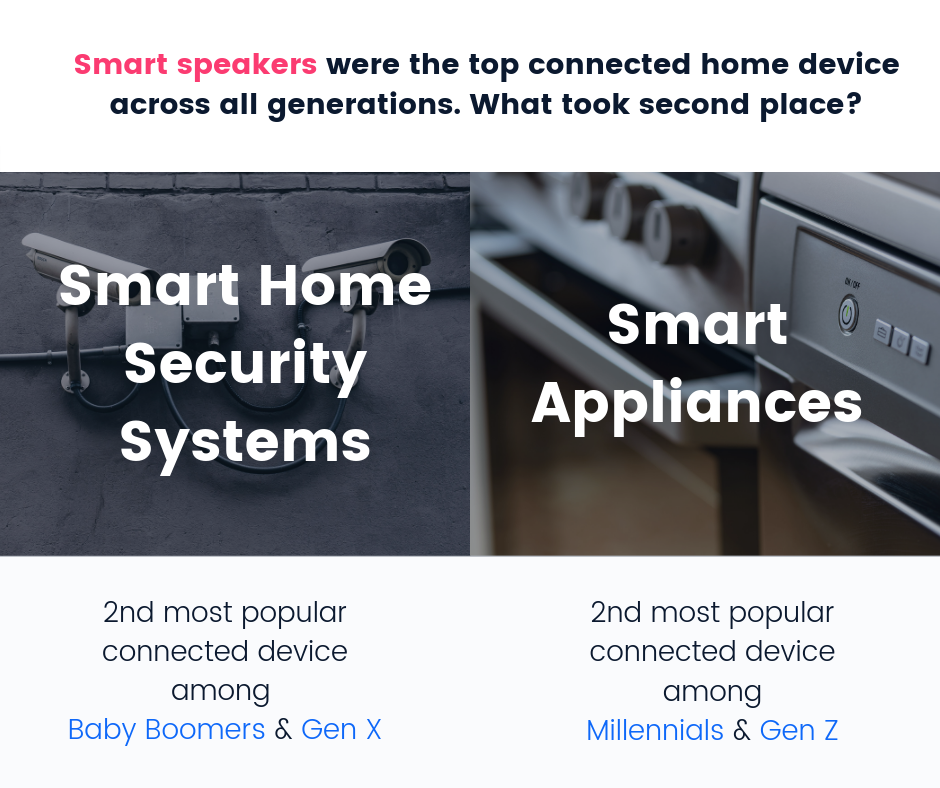Gen Z keeping connected online and IRL.
We know that Gen Z (born 1995-2015) is the most connected generation of all time, but does their time online translate into close relationships with their peers? And how do they compare to the generations before them?
As a part of our Gen Z Survey Series, we surveyed Americans of all ages to learn what impact, if any, our increasing use of devices has on our connectedness with each other.
Key Takeaways:
- Social butterflies: While most Americans wish they could spend more time with their friends in person (56.5%), 50% are still in contact with their friends “every day” via text or chat.
- Millennials might have killed plenty of other things, but they didn’t kill brick-and-mortar. Gen Z reports going to the mall and the movies more often than Gen Y.
- Who are the real communicators? Gen Z dads are seeing and chatting with their friends more regularly than Gen Z moms, and are more than twice as likely to be satisfied with the amount of face time they have with their pals.
Our Findings—Connected Lives
Perhaps unsurprisingly, the generation that grew up surrounded by technology naturally includes it as a regular part of their social activity. Gen Z shows a pretty even split in their preference of how they like to engage with their friends. A little more than half would prefer to maintain social relationships with friends online, through video games, social media, or text, whereas the rest showed a preference for in-person interactions, either out on the town or spending time at their home or a friend’s.
However, unlike other generations, social activity doesn’t need to take place either online or off to foster genuine, close relationships and Digital Natives thrive when they stay connected to their friends in multiple ways.
Online, but not outcasts.
Back in the 80s and 90s, the kids who played video or computer games might have been doing so due to a lack of social skills, but that’s not the case today. It would seem that all mediums are fair game to connect for Gen Z—if they want to socialize at all. Those who report playing 6 or more hours of video games per week also report being more active offline than those who don’t play games or do so fewer than 5 hours a week.

About 35% of those who are playing games are also going to the movies once a month, and over 50% are participating in a sport or in-person hobby once a week or more. About 30% of this group also reportedly goes to the mall about once a month and eats out about once a week. They are more likely to have connected devices in their homes and more likely to spend time outside the home with their friends than non-gaming Gen Z.
In contrast, Gen Z who are playing video or computer games 5 hours per week (or less) are also less engaged in other ways. 46% report going to the movies only a few times per year and only 30% are participating in a sport or hobby with their peers. They are less likely to be streaming media, less likely to be spending time in the mall, and… less likely to want to. In spite of not feeling as close to their friends overall than those who use gaming as another layer to connect with friends, 44% of this group expressed that they wish they could disconnect even more of the time.
Next Gen Parents.
The oldest members of Gen Z are already 24 years old, and while parenting is always a challenge for young adults, it’s particularly isolating for Gen Z moms. Perhaps due to Gen Z’s rejection of traditional masculinity, it’s Gen Z dads that are generally happier and maintaining active social lives with their friends.
33% of Gen Z who are already fathers report seeing their friends every day, and another 27% say they see their friends a couple times a week. 73% also report having daily text message communication with their pals, and ranked this as their preferred method of engaging in those relationships. Over half of Gen Z dads are satisfied with the amount of face time they are getting with their friends, and 26% ranked their feelings of emotional connectedness towards them as a 10 (on a scale of 1-10).
Alternatively, 81% of Gen Z moms wish they could spend more time with their friends, whom only 9% report seeing every day. Although Gen Z moms are still very communicative with their friends via text (95% are in regular text communication either daily or a few times a week with their friends), this was not their preferred method of engagement, with the majority wishing they could spend time with friends in person. This may be why Gen Z moms had a somewhat polarized rating in reaction to how close they felt in their friendships, in spite of the many technological advances that allow them to communicate in other ways.

Connected Homes
Millennials (age 25-28) have long been known for their embrace of new technology, so it comes as no surprise that they are the leaders of connected home device implementation with 61.5% having one or more smart devices. However, Millennials were also the most skeptical of the impact of smart devices on our safety, with 23% suggesting that connected devices made us “less safe”. Interestingly, a quarter of the 42% of Millennial men that expressed that connected home devices had “no impact” on our safety reported owning smart home security systems.
Baby Boomers (age 55 and up) were the least likely to have smart home devices, with 63.5% reporting to have none, although 55% believed that they added to our safety.
The most popular connected home device among all generations was “smart speakers” followed by “smart appliances” for Millennials and Gen Z, and “smart home security systems” for Baby Boomers and Gen X.

We surveyed 800 respondents in the United States, nationwide, across 4 generations of Americans. We implemented quotas to reach an equal number of respondents in the Baby Boomer, Gen X, Gen Y (Millennial), and Gen Z cohorts. We achieved results in under a day and our full data set can be viewed here.
Curious about what else Gen Z thinks? Launch your own survey or chat with one of our market research experts to learn how to frame your questions.
Do you want to distribute your survey? Pollfish offers you access to millions of targeted consumers to get survey responses from $1 per complete. Launch your survey today.
Global GSK Shingles Survey Insights
Original Insights,The Pollfish Blog
February 24, 2024
Shingles misconceptions: new global survey commissioned and funded by GSK highlights widespread…
B2B Sales Emails: Are they Effective or a Nuisance?
Original Insights,The Pollfish Blog
September 6, 2022
Are B2B sales emails a thorn in your side? Do they drive you crazy? Virtually all white-collar…
